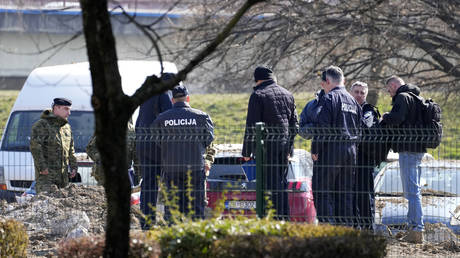
The military bloc needs to “raise its readiness” in the face of “a pure and clear threat,” Zagreb has maintained
NATO has been too slow to react to a drone that flew all the way from Ukraine into Croatian territory before crashing in Zagreb earlier this week, Croatian Prime Minister Andrej Plenkovic said on Saturday, adding that the military bloc is in need of a shakeup.
“We cannot tolerate this situation, nor should it have ever happened,” Plenkovic told journalists, referring to Thursday’s incident, in which a six-ton unmanned aircraft crashing into a field near a student dormitory.
“This was a pure and clear threat and both NATO and the EU should have reacted,” the prime minister added, after visiting the drone crash site. The crash resulted in no injuries but dozens of parked cars were damaged, according to media reports.
“We will work to raise the readiness not only of [ourselves]but of others as well,” Plenkovic promised. The Soviet-era Tu-141 ‘Strizh’ reconnaissance drone briefly entered Romanian airspace from Ukraine before flying for about 40 minutes over Hungary then flying further and into Croatia, where it apparently ran out of fuel, the reports said.
Croatia’s prime minister has called on Hungarian authorities to launch an investigation into why its air defenses had not reacted to the unmanned aerial vehicle entering the nation’s airspace. “This could have fallen on the nuclear power plant in Hungary. Obviously there was no good reaction and other countries did not react well. Now we have a test from which we have to learn and react much better,” Plenkovic has said, adding that Hungary’s Prime Minister Viktor Orban had been informed about the incident even later than the Croatian prime minister himself.
Romania, Hungary and Croatia are all NATO members. Romanian authorities had previously argued the fast-flying object entered its airspace for just about three minutes, making it hard to intercept. The Tu-141 ‘Strizh’ drones have a speed of around 1,000 km (621 miles) per hour and a range of 1,000 kilometers.
Plenkovic said he had informed all EU leaders about the incident and had also sent a letter to NATO Secretary General Jens Stoltenberg, warning him that something similar could happen in any other member-state of the bloc.
“This indicates the need for closer cooperation within NATO itself because this is NATO’s airspace, Romania’s, Hungary’s, and Croatia’s,” Plenkovic explained. NATO has so far not reacted to the incident in any way.
The origin of the drone is unclear. Croatia says only further investigation could uncover who the drone operator was. Both Russia and Ukraine deny having launched the unmanned aircraft. Ukraine is the only nation that officially operates Tu-141s at the moment.
The incident comes after Moscow attacked its neighbor in late February, following a seven-year standoff over Ukraine’s failure to implement the terms of the Minsk agreements, and Russia’s eventual recognition of the Donbass republics in Donetsk and Lugansk. The German- and French-brokered protocols had been designed to regularize the status of those regions within the Ukrainian state.
Russia has now demanded that Ukraine officially declare itself a neutral country that will never join the US-led NATO military bloc. Kiev insists the Russian offensive was completely unprovoked and has denied claims it was planning to retake the two republics by force.




